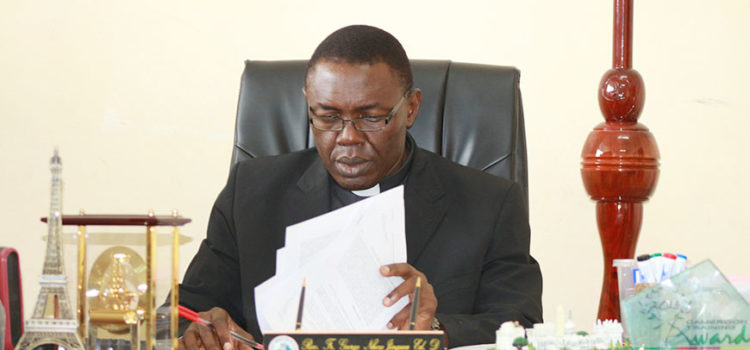President Nkeze Clarifies CUIB’s Afro-American Model Of Education
In his “End of Year State of the University Address”, President Nkeze clarified the current debate going on in Cameroon whether CUIB is Anglo-Saxon or Afro-American. President Nkeze was very Categorical – CUIB is Catholic and Afro-American in Character. It is not Anglo-Saxon! The President explained to the entire CUIB faculty, staff and students that the Colonial period ushered in the Anglo-Saxon university system which was based on Western European culture. The British set up educational institutions to train clerks to serve in the colonial administration. Emphasis was on language, reading, writing and calculations. No attention was given to the development of technical education. In the domain of Higher Education, their universities were fashioned on British standards, Oxford and Cambridge. The programs of their first universities in Africa such as Lagon and Lagos were dictated and monitored from London. The French on the other hand kept to their policy of assimilation. Higher education was to train the African to think, speak and reason like a Frenchman. And when he was fully assimilated, he was awarded French citizenship and enjoyed all political rights as a Frenchman. The Portuguese and Belgians also adopted a policy of assimilation and in their territories education advancement was very slow. At Independence for instance, Belgian –Congo, that is Zaire, had only twelve graduates. The President went further to highlight some of the disadvantages of the Colonial system of schooling which destroyed the traditional African education system with its emphasis on the community, spiritual, moral and technological and fostered a “caste” or “elitist” system of education that was based on sorting out so called “Good and intelligent Africans” from “unintelligent ones”.
The CUIB model, President Nkeze explained is very unique as it embraces two systems in one, namely the Afro-American University model. First, as African or Afro or African Centered it seeks to reflect the high values that existed in African universities prior to the slave trade and the Colonial period where education was considered as both the formal and informal process wherein a people rationally guide and systematically guarantee the reproduction and refinement of the best of themselves. These universities developed an educational system based on the African world view which holds dear and sacred the belief in the human perfectibility, the belief that humans could indeed become more like God. Basic skills were merely the lowest level of education and methods of education emphasized the tutorial, apprenticeship and social learning. The development of character, humanity and spirituality were higher levels of attainment. Students were trained to become Godlike, specifically in adhering to the principles of excellence, harmony, order, reciprocity, communion and justice. It fostered a “wholistic” education that endures which was reflected in the concern for the everlasting, the continuity of the African culture and the Divine imperative. Soul education as you find in CUIB was Africa’s calling in the pre slave trade and colonial period.
Second, CUIB is also American as it seeks to reflect the current United Sates of America (USA) experiential and high-level management university system in terms of governance, curriculum, grading, university structure and aspiration as influenced by the American Philosopher, Psychologist, and educational reformer John Dewey (1859-1952). Dewey known today as the Modern Father of Experiential Education believed that learning ought to be active, practical and focused on real, guided experiences, real-life tasks and challenges that will enable learners develop the capacity to contribute to society. What a good mix to have soul education (Africa) and Experiential and hands-on (US) brought to one. There is no doubt that the Afro-American model is line with CUIB’s mission, identity and character to prepare Job creators versus Job seekers with spiritual and moral values who will contribute to the sustainable development of their communities. (Read more)

